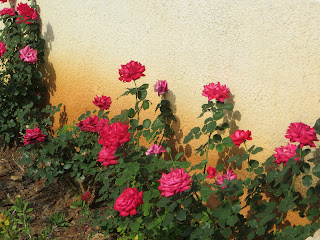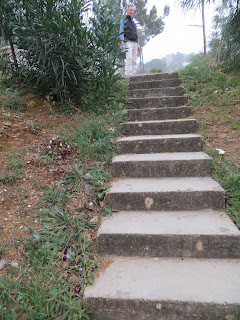Tomorrow Larry and I will pack up our summer clothes and a few bags of toiletries to return to a room in the girls' dorm for a few more weeks. Our little villa is still under construction and our absent hosts, who have blessed us with a comfortable home for two months, will be returning from their annual leave in two days.
I don't mind at all.
We arrived with 8 suitcases and two carry-ons two months ago. That represented the things we considered necessary and non-replaceable. Our pilot visit in November tipped us off to a few things we might want to bring: My favorite vegetable peeler. A generous supply of volumizing shampoo and mousse for fine hair. Twenty bars of Ivory soap. My Cutco knife set. Two 1/8 size violins. Two! Their value is still under question, as I've comfortably transitioned into a far different livelihood. But there they sit taking up good space, yet to prove their worth!
But with the possibility of being placed in an empty apartment to wait, we've also acquired a room full of Lucky Home purchases. Iron and ironing board. Drying rack and clothes hampers. Hangars and trash cans. Seasonings. Dishes and glasses and kettles and hotpads and...
Never heard of Lucky Home? Walmart has just met some stiff competition. But since WallyMart probably will never get within a few thousand miles of here...
Lucky Home is a hard-to-beat housewares store packed in under one of the nearby apartment complexes--the Dollar Store of everything kitchen/cooking/eating/serving. It could boast of the best prices and the thickest congestion of household products in the neighborhood if it did any advertising. But evidently it doesn't need to. All of Sabtieh Hill--and beyond--know about Lucky Home. And that's enough to keep a contingent of staff busy finding places for customers to park. Most retailers have a fellows on the street to "handle" customer parking, as open parking lots are absolutely rare among the never-ending apartment complexes. And only the western-style malls in the area have parking garages. A slight hesitation of a passing car will tip of the parking staff of a potential customer. Without hesitation he will offer to take your keys and double park you anywhere nearby that will allow at least a single lane to cut between apartment buildings. If you're willing. If you look frightened he'll just cut his hand through the air in disbelief, "Not worry. I work here. Why I take your car?" If you're independent-minded like one friend I was with, you double park yourself and pull a large cardboard out from under the seat with your cellphone number scribbled on it and perch it on the dashboard.
Lucky Home, like many of the retailers in town, is staffed by all men--at the cashiers, on the floor, in the stockroom, on the street, everywhere. If you indicate you're equipping a household, you get a personal assistant who will follow you around explaining, suggesting, pricing, and carrying your goods. And he knows his housework. Which brooms pick up dirt the best. Which kettles will burn your food. The most efficient tea kettle. Which toilet cleaners will match your bathroom. At first I thought he was just throwing out random suggestions, but evidently he listened to know my colors, style preferences, price range, taste....and probably even figured out my personality to.
All that to say...we bought Lucky Home out last week. Now, with a dorm room instead of an apartment, we have to store all of it while we wait for our little villa. So instead of eight suitcases, we have a room filled with unwieldy, unpackable housewares. We had to replace all the trivia we sold at our yard sale a few months ago! Luckily (for Lucky Home) we spent less here replacing everything then it would've cost to ship.
So I don't mind at all.
When people inquire if I'm impatient to get settled, I just tell them that since I spent 27 years in one place I can move several more times in the next few months and still hold a good average! These two months have been an unusually pleasant, restful blessing. We accepted the McKenzie's offer readily and we've enjoyed every bit of their beautiful hospitality.
That's because, in addition to a panoramic view of the Mediterranean and breezes that blow above much of the city pollution, we've enjoyed a beautiful garden setting. Evidently the staff family who lived here when the house was first remodeled after the war were avid gardeners. The pictures below capture only some of their investment and don't include the flaming bougainvillea or apricot blossoms that were in bloom when we first moved in. Or a thousand snow-white droplets that covered the lawn in early spring. The pictures were taken before the gardenia bushes out front gave way to high-class aroma-therapy for anyone sitting on the front porch. The pictures also don't show the late-blooming bougainvillea that will soon cover much of the front of the house. Or the small daisies that will be scattered across the hillside behind us. There's still a show before a dusty, parched summer sets in.
As I look at all that someone invested years ago--choosing the colors, planning the blooming times, placing each artistically along terraces and walks, and watering faithfully through Lebanon summers--fully aware others would get to enjoy it all--I know I've received a "beautiful hospitality." Because a flower stands for so much that is....home.
Is that why I already have 20 geranium plants waiting to live in window boxes at my new little villa?
I don't mind at all.
We arrived with 8 suitcases and two carry-ons two months ago. That represented the things we considered necessary and non-replaceable. Our pilot visit in November tipped us off to a few things we might want to bring: My favorite vegetable peeler. A generous supply of volumizing shampoo and mousse for fine hair. Twenty bars of Ivory soap. My Cutco knife set. Two 1/8 size violins. Two! Their value is still under question, as I've comfortably transitioned into a far different livelihood. But there they sit taking up good space, yet to prove their worth!
But with the possibility of being placed in an empty apartment to wait, we've also acquired a room full of Lucky Home purchases. Iron and ironing board. Drying rack and clothes hampers. Hangars and trash cans. Seasonings. Dishes and glasses and kettles and hotpads and...
Never heard of Lucky Home? Walmart has just met some stiff competition. But since WallyMart probably will never get within a few thousand miles of here...
Lucky Home is a hard-to-beat housewares store packed in under one of the nearby apartment complexes--the Dollar Store of everything kitchen/cooking/eating/serving. It could boast of the best prices and the thickest congestion of household products in the neighborhood if it did any advertising. But evidently it doesn't need to. All of Sabtieh Hill--and beyond--know about Lucky Home. And that's enough to keep a contingent of staff busy finding places for customers to park. Most retailers have a fellows on the street to "handle" customer parking, as open parking lots are absolutely rare among the never-ending apartment complexes. And only the western-style malls in the area have parking garages. A slight hesitation of a passing car will tip of the parking staff of a potential customer. Without hesitation he will offer to take your keys and double park you anywhere nearby that will allow at least a single lane to cut between apartment buildings. If you're willing. If you look frightened he'll just cut his hand through the air in disbelief, "Not worry. I work here. Why I take your car?" If you're independent-minded like one friend I was with, you double park yourself and pull a large cardboard out from under the seat with your cellphone number scribbled on it and perch it on the dashboard.
Lucky Home, like many of the retailers in town, is staffed by all men--at the cashiers, on the floor, in the stockroom, on the street, everywhere. If you indicate you're equipping a household, you get a personal assistant who will follow you around explaining, suggesting, pricing, and carrying your goods. And he knows his housework. Which brooms pick up dirt the best. Which kettles will burn your food. The most efficient tea kettle. Which toilet cleaners will match your bathroom. At first I thought he was just throwing out random suggestions, but evidently he listened to know my colors, style preferences, price range, taste....and probably even figured out my personality to.
All that to say...we bought Lucky Home out last week. Now, with a dorm room instead of an apartment, we have to store all of it while we wait for our little villa. So instead of eight suitcases, we have a room filled with unwieldy, unpackable housewares. We had to replace all the trivia we sold at our yard sale a few months ago! Luckily (for Lucky Home) we spent less here replacing everything then it would've cost to ship.
So I don't mind at all.
When people inquire if I'm impatient to get settled, I just tell them that since I spent 27 years in one place I can move several more times in the next few months and still hold a good average! These two months have been an unusually pleasant, restful blessing. We accepted the McKenzie's offer readily and we've enjoyed every bit of their beautiful hospitality.
That's because, in addition to a panoramic view of the Mediterranean and breezes that blow above much of the city pollution, we've enjoyed a beautiful garden setting. Evidently the staff family who lived here when the house was first remodeled after the war were avid gardeners. The pictures below capture only some of their investment and don't include the flaming bougainvillea or apricot blossoms that were in bloom when we first moved in. Or a thousand snow-white droplets that covered the lawn in early spring. The pictures were taken before the gardenia bushes out front gave way to high-class aroma-therapy for anyone sitting on the front porch. The pictures also don't show the late-blooming bougainvillea that will soon cover much of the front of the house. Or the small daisies that will be scattered across the hillside behind us. There's still a show before a dusty, parched summer sets in.
 |
| Waiting to look like home. |
Is that why I already have 20 geranium plants waiting to live in window boxes at my new little villa?
 |
| Whether I know the name of the flower or not, I've enjoyed several enormous bushes of solid pink, red, and wine. |
 |
| Could this possibly be lavendar? A handful of crushed leaves seem credible to me! |
 |
| Intense oranges, yellows and pinks edge walls and walks. |
 |
| It's a larger honeysuckle blossom than on Jones Road--aroma therapy that is strong enough to cover the exhaust of Beirut traffic that can reach up Sabtieh Hill on a smoggy day. |
 |
| A rose is a rose is a rose. And they're everywhere... |
 |
| ...but mini-roses catch my attention. |
 |
| Iris enjoy Beirut as well as Berrien, and remind me of home... the best kind of hospitality! |


.jpg)



























